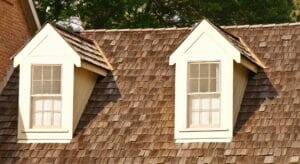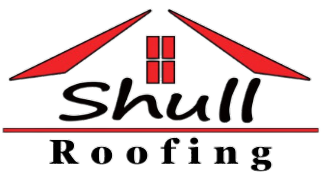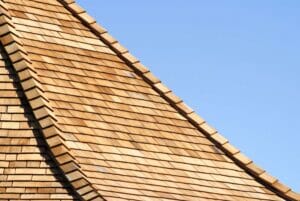One of the most popular choices for roofing material in Great Bend is cedar. Cedar roofing offers a rustic and charming appearance, excellent durability, and natural insulation properties. However, homeowners in Great Bend often find themselves torn between synthetic and natural cedar roofing options, each with its own set of advantages and disadvantages. Here are the differences between synthetic and natural cedar roofing and some tips to help you decide which option is the best fit for your home.

Understanding Cedar Roofing
Cedar roofing is renowned for its natural beauty and resilience, making it a sought-after choice for homeowners who value aesthetics and longevity. Before we delve into the synthetic vs. natural cedar debate, let’s take a closer look at both options.
Natural cedar roofing is created from real cedar wood. Cedar shingles or shakes are cut from logs and used to make a stunning, rustic appearance for your home. Here are some of its advantages:
- Aesthetic Appeal: Natural cedar roofing exudes timeless charm, providing a classic and elegant look. It blends seamlessly with various architectural styles.
- Durability: Cedar is naturally resistant to decay and insect infestations, which helps extend the lifespan of your roof.
- Energy Efficiency: Cedar roofing offers excellent insulation properties, helping you regulate indoor temperatures and reduce energy consumption.
However, natural cedar roofing also comes with some drawbacks:
- Maintenance: Cedar roofing requires regular maintenance, including cleaning, staining, and sealing, to prevent weathering and rot.
- Cost: Natural cedar roofing can be more expensive upfront compared to synthetic options.
Synthetic Cedar Roofing
Synthetic cedar roofing, often made from materials like polymer or composite materials, attempts to mimic the appearance of natural cedar while addressing some of its shortcomings. Here are the advantages of synthetic cedar roofing:
- Low Maintenance: Synthetic cedar roofing requires less maintenance, as it is more resistant to decay, insects, and weathering. It doesn’t need staining or sealing.
- Cost-Efficient: While the initial cost may be higher than asphalt shingles, synthetic cedar roofing can be more cost-effective over its lifespan due to reduced maintenance expenses.
- Versatility: Synthetic cedar roofing offers various color and style options, allowing homeowners to customize their roofs to their preferences.
However, synthetic cedar roofing has its downsides:
- Aesthetic Differences: While synthetic options closely resemble natural cedar, some homeowners may still prefer the authentic look of real wood.
- Environmental Concerns: Some synthetic materials may not be as eco-friendly as natural cedar.
Choosing the Best Option
Now that we’ve examined the pros and cons of both synthetic and natural cedar roofing, let’s discuss how to choose the best option for your Great Bend home.
- Budget: Consider your budget and long-term financial goals. Natural cedar roofing may have a higher upfront cost, but it can be more cost-effective over time due to its durability and energy efficiency. Synthetic cedar roofing may be a better choice if you need to minimize initial expenses.
- Aesthetic Preferences: Your personal style and the architectural design of your home play a significant role in your decision. If you value the authentic and rustic appearance, a natural cedar roofing is the way to go. If you prefer a similar look with less maintenance, synthetic cedar roofing is a viable option.
- Maintenance Commitment: Assess how much time and effort you are willing to invest in roof maintenance. Natural cedar requires more attention, including regular cleaning and sealing, while synthetic options are more hands-off.
- Environmental Concerns: If sustainability is a top priority, research the environmental impact of the materials used in synthetic cedar roofing. Some manufacturers offer eco-friendly options that mimic the look of cedar while minimizing environmental harm.
Choosing Shull Roofing in Great Bend
When installing and maintaining cedar roofing, it’s wise to work with a reputable roofing company in Great Bend. In Great Bend, Shull Roofing stands out as a trusted name in the industry. With years of experience and a commitment to quality craftsmanship, Shull Roofing can help you make an informed decision between synthetic and natural cedar roofing.
The choice between synthetic and natural cedar roofing depends on your budget, aesthetic preferences, maintenance commitment, and environmental concerns. Both options have their merits, and your decision should align with your unique needs and priorities. With the guidance of experts like Shull Roofing in Great Bend, you can enjoy the beauty and durability of cedar roofing for years to come, no matter which option you choose.

